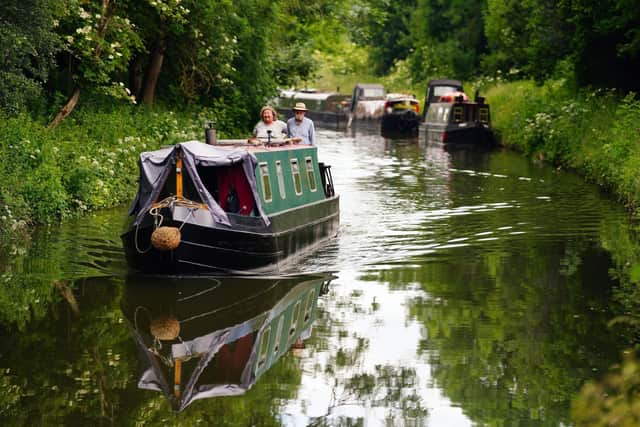Why does life on a canal boat have to be made so difficult - GP Taylor
It is estimated that 352,000 people will take a holiday this year on a canal boat. For those of you who have never experienced this, you should book one right now. They are the best holidays of all time and a week on the water is worth a month in the sun, especially if you journey on any of Yorkshire’s beautiful waterways.
For me, I would say that I am now a firm canal boat addict. I love the slow pace of life, the stopping where you want and the joy of being in the open countryside. You are never far away from an abundance of history and live-on-board boaters are always on hand to offer help and advice.
Advertisement
Hide AdAdvertisement
Hide AdOver the years, I have had many conversations with people who have chosen to live on their canal boats full time. Yet, after 2012, I noticed a change in the atmosphere on the canals. At first it was hardly noticed and as time progressed, the organisation that took over has, in my opinion, lacked compassion and turned running the 2,000 miles of canals into a trendy, big business.


There are many thousands of people who live on the canals permanently and cannot either find or afford to pay for a full-time mooring. It is estimated that 5,000 out of the 32,000 licensed boats are registered for “continuous cruising”. This means that people living on board have to move every 14 days in one direction.
So, if you cannot afford or can’t find a mooring then life can become very hard. Sadly, the Canal and River Trust (CRT), which is a charity, shows very little charity to those who cannot keep this up. The CRT even employ their own version of parking wardens to track boats and seek out offenders. Everybody who owns a boat has to pay the CRT up to £1,300 per year just to put the boat on the water and for that, they ridiculously expect you to keep moving on.
This makes it very difficult for live-on-boarders to keep a job or get their children into school. The CRT guidance says: “Unacceptable reasons for staying longer than 14 days in a neighbourhood or locality are a need to stay within commuting distance of a place of work or of study (eg; a school or college).” In other words, the CRT believes the education of children or the need to travel to work are not good enough reasons to allow a reduction in cruising.
Advertisement
Hide AdAdvertisement
Hide AdYet, the land-based travelling community would be given every help in regard to work and schooling and regulations adjusted to support this. Land-based travellers have set aside camp sites specifically for them where they can stay as long as they like. This is not so for the many families who want to live on the canals.
It makes me want to ask the question, is the CRT trying to get rid of those people who have made the lifestyle choice to live on narrow boats? Do they no longer want the ‘gipsies of the water’ on their canals.
After all, it would appear that the CRT is quite a draconian organisation as they even want you to get permission to moor against your own waterside property. They make it very clear that they own the canal bed. End-of-garden mooring is something else it would seem that they seek to control. If the CRT does have a mooring, they are often auctioned to the highest bidder, and moorings range from about £2,300 to £5,800 a year. This puts them out of reach for most people living on the canals.
Many boaters have been objecting to the current enforcement process, and claim it is in part an attempt to cleanse the waterways of a counter-culture of canal boat dwellers in favour of more use of the canals by visitors and holiday-makers. One boater told the BBC: “The first people to go will be the families, and if you take the families off this canal you are ripping the heart out of this community. I think it’s very sad.”
Advertisement
Hide AdAdvertisement
Hide AdIn 2016 according to the BBC, the Canal and Rivers Trust carried out enforcement proceedings against 45 boat owners who have been refused further licences because of repeated failures to travel sufficiently. It instructed solicitors to seek court orders to seize the boats in 15 cases. Two canal boats were removed from the water and destroyed. Surely, this enforced movement of boats has to stop. The licence fee should cover being able to moor for as long as you want.
After all, it is a fact that canals where there are full-time boats moored are safer, better kept and cleaner. Live-on- board boaters add colour and life to the waterways of Yorkshire.
GP Taylor is a writer and broadcaster who lives in Yorkshire.